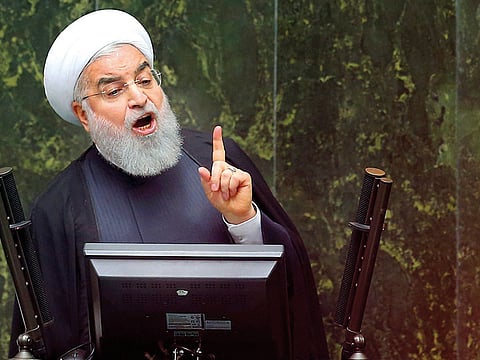Sanctions may curb Iran support for extremists
JCPOA seemed to have emboldened the regime and enabled the suppression of the Iranian people

London: When President Donald Trump withdrew in May from the Joint Comprehensive Plan of Action (JCPOA), colloquially known as the Iran Nuclear Deal, many Iranians took to social media using the hashtag #ThankYouTrump. The deal was supposed to foster stability and peace in the region by containing Iran’s nuclear programme. By removing sanctions, the Iranian people were supposed to benefit from more money in the economy and a more open Iran. Instead, the opposite happened.
Tehran has incited increasing instability throughout the region by supporting extremist organisations in Lebanon, Palestine, Iraq, Syria and Yemen. In January, thousands took to the streets of the cities Khomeini Shahr and Mashhad in anger at the rising cost of living and a sluggish economy. Their ire was targeted at a regime that has spent billions on its proxies abroad, ignoring the needs of its citizens at home. These “missing billions” have crippled an Iranian economy characterised by accelerating unemployment, poverty, inflation, corruption and widespread mismanagement. Tehran has also fomented unrest on the Arabian Peninsula. The JCPOA seemed to have emboldened the regime and enabled the suppression of the Iranian people.
By giving Tehran access to billions of dollars of sanctions relief, the JCPOA helped to fund Iranian rockets, landmines, guns and heavy weaponry in Syria and Yemen. It became a life-saving deal for Bashar Al Assad rather than a strategy through which to curb his destabilising influence. Al Houthi fighters, whose war crimes include using civilians as human shields, the recruitment of child soldiers and the indiscriminate laying of landmines, proudly name Ayatollah Ali Khamenei as their supreme leader.
US statistics show Iran contributes $60m-$100m dollars a year to the Lebanese militant group Hezbollah. Yet despite knowing what Iran was doing in the region, the previous US administration and European countries remained silent, in large part to protect the JCPOA.
Since Trump withdrew from the deal, however, Al Houthis have been pushed back. Sanctions due to take effect Monday may finally force them to the negotiating table. The sanctions specifically target the Iranian security forces - the same forces reportedly involved in the planning of recent foiled terrorist attacks in Europe, and with spreading Iran’s influence by training and funding terrorist organisations.
The past has shown us the power of sanctions before, playing a key role in bringing Iran to the table in 2015. This time, the focus must be on curbing Iran’s support for foreign extremists. It’s what the Iranian people want.
Raman Ghavami is an Iranian Middle East analyst.



